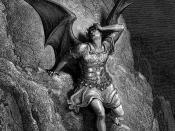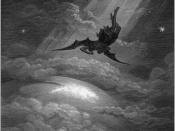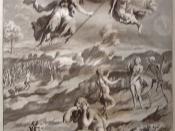EN335
Eve's Defective Character
Abstract: "Eve's Defective Character" analyzes and examines the between-the-lines defense provided by John Milton for the character of Eve in his epic poem, Paradise Lost. The paper argues that, "[Eve] is imbued with a strong female curiosity and a drive to reach a level of equality with Adam, but [that] she lacks the makeup to fulfill these lofty aspirations-- inherently she is nothing outside of a companion for Adam, and it's this faulty composition that dooms her." Outside of analyzing Paradise Lost itself, the paper considers Jeff Davis' "On Bending," and Kori Hensell's "The Shifting Concept of Good and Evil in Paradise Lost" as concurring and supporting opinions.
It's one of the most common theological and literary topics of discussion: the contrast between good and evil. Some of the best examples lie in the sacred texts of the Hebrew Bible, but no one, aside from Satan, has caught more negative publicity than Ever herself.
After tempting Adam to eat the fated apple, Eve becomes the sole reason for the entire human race's fall from grace. She is seen as the original "devil's advocate," but stepping outside of the realm of biblical scholasticism, Milton's Paradise Lost paints quite a different picture. Milton assigns Eve a character, a personality, and in doing so, quite the defense plea. Famed in the Bible as the mother of mankind, Milton attends more closely to her being the original female: desperate for attention, acknowledgment, and self-value, yet contradicting herself by arguing simultaneously for unrestrained independence. Milton portrays Eve as faultily made from the start, being overwrought with naivete and lacking the judgement to withstand Satan's temptations. By looking at the innately insufficient makeup of her character, examining her social behavior and maturity level in the events leading up to the...


